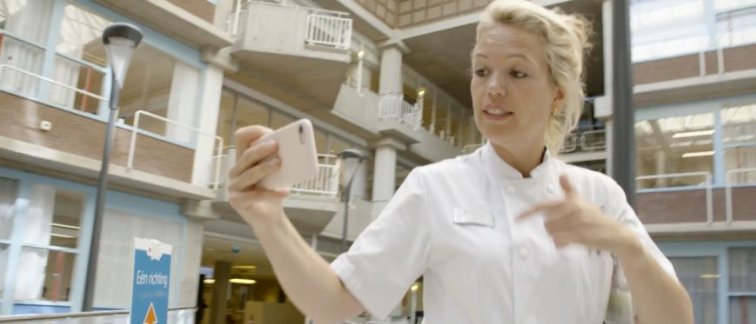This pandemic has led to new ways of working together, and we should try to keep the best changes after the pandemic is over.
Prof. Ben Slotman.
Advancing research: clinical trials during the pandemic
Worldwide, clinical trials were disrupted by the pandemic. Scientists and medical professionals worked hard to minimize the impact of COVID-19 on their endeavors to find better treatments for patients with cancer.
Niels Wondergem, PhD student at the department of Otolaryngology and Head and Neck Surgery, was excited to begin investigating if a type of immunotherapy administered before surgery would make a difference for advanced oral cancer patients. But the pandemic intervened. “Our NeoNivo neoadjuvant immunotherapy trial for patients with oral cancer was suspended for four months,” says Niels. Social distancing and isolation measures to safeguard potentially vulnerable patients from SARS-Cov-2 made it a huge challenge to enroll new patients, especially since various medical professionals from different departments needed to be involved to provide care. Niels Wondergem: “When we finally received an ‘all clear’ to continue the study, the enrollment of new patients went very well. Of course, our medical research team was very motivated to make up for ‘lost’ time and make progress in the treatment of our patients. We were also very well prepared logistically to welcome new patients after the temporary stop, with all health safe-guarding measures in place.” Although the temporary halt meant that the study’s end date had to be postponed, the NeoNivo neoadjuvant immunotherapy trial has currently enrolled 13 of 15 intended patients and is proceeding as planned with an estimated end date later in 2022.
Continued support from the CRISPR expertise center
The CRISPR Expertise Center offers researchers full–spectrum support in the use of the revolutionary gene-editing technology called ‘CRISPR’. To help Amsterdam UMC stay at the forefront of this rapidly evolving field, our CRISPR experts regularly organize courses for PhD students and international seminars featuring leading researchers in the field. “Mainly through online meetings, the Cancer Center Amsterdam CRISPR Expertise Center has continued to provide support, and design and perform successful gene editing experiments. A strict schedule was implemented to perform our laboratory work while complying with COVID-19 regulations like social distancing. In addition, we organized a CRISPR course for the Oncology Graduate School Amsterdam. Together with a panel of national and international top speakers, we discussed the latest developments of the technology, and challenged PhD students with new applications of CRISPR in their projects.” Dr. Rodrigo Leite de Oliveira, manager of Amsterdam UMC Cancer Center Amsterdam CRISPR Expertise Center.
Online education: ongoing training for PhD students in oncology
Oncology Graduate School Amsterdam (Onderzoekschool Oncologie Amsterdam) is a joint graduate school of the Amsterdam UMC (location AMC & VUmc) and NKI-AvL, dedicated to the training of more than 850 PhD students working in the field of Oncology. In 2020, the Oncology Graduate School rose to the challenge of the pandemic and took their courses online. “We are very proud that we have managed to maintain our course program during the COVID-19 pandemic. We converted all our courses to online platforms, thanks to the flexibility of the course organizers, teachers, as well as the PhD candidates. In addition to lower (internal) costs, a great advantage of online courses was that PhD students who were working abroad could easily continue to participate in our educational program.” Dr. Esther Ruhé – Coordinator of Oncology Graduate School Amsterdam.
A vlog for medical interns
Because of the COVID-19 pandemic, medical interns were no longer able to experience education by visiting hospital patients under the supervision of an expert physician. “That’s why I started vlogging together with the ‘digi-team’ of intern volunteers: the camera follows my interaction with patients to provide education about real-life care,” says Dr. Susanne van der Velde, surgical oncologist. She continues: “At first it seems strange: online education for a profession that demands hands-on clinical interaction. But, our vlogs are very informative and were very well received. Also, the increasing focus of Amsterdam UMC on treating complex diseases narrows the clinical diversity our physicians encounter. In the vlogs, we are able to expose interns to a wide range of clinical cases, which is very important at this early stage in their careers.”
Watch the video here of Susanne van der Velde.

